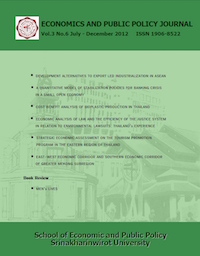ECONOMIC ANALYSIS OF LAW AND THE EFFICIENCY OF THE JUSTICE SYSTEM IN RELATION TO ENVIRONMENTAL LAWSUITS: THAILAND’s EXPERIENCE
Main Article Content
บทคัดย่อ
The economic analysis of law is a valuable theoretical concept that is used to analyze the efficiency of the justice system. This paper illustrates such concept to identify inefficiency elements in the legal process, which comprise the cost of operation in the process, Ca, and the cost of the judgment’s error, C(e). Qualitative procedural efficiency, such as the neutral treatment of a judge, is also discussed but not a main focus of the study. The paper first reviews the literature on environmental lawsuit cases and subsequently develops indicators to analyze judges’ decision making. The environmental cases can be categorized into three case types. The first type is Lok-Ron cases (global warming case), in which the government sues ordinary, non-capitalist citizens for allegedly aggravating the global warming problem by practicing deforestation or by utilizing state-owned land. Both Ca and C(e) inefficiencies are prevalent in Lok-Ron cases. The second type is legal cases arising from the local’s concerns on the protection of public resources. Despite the citizens’ good intention and efforts, the legal system makes the task harder because of Ca. The third type are legal cases involving impacts from environmental pollution, where the affected have filed against both the polluters and the government for nonfeasance and are likely to face another form of injustice such as an underestimation of the compensations, which is fundamentally C(e). All inefficiencies in term of costs are resolved by the concept of cost minimization and fair cost distribution.
Article Details
ประเภทบทความ
บทความวิจัย
สงวนลิขสิทธิ์ © 2553 คณะเศรษฐศาสตร์ มหาวิทยาลัยศรีนครินทรวิโรฒ
คณะเศรษฐศาสตร์ มหาวิทยาลัยศรีนครินทรวิโรฒ จัดพิมพ์วารสารเศรษฐศาสตร์และนโยบายสาธารณะ เพื่อเผยแพร่บทความวิชาการทางเศรษฐศาสตร์ นโยบายสารธารณะ และสาขาอื่นๆที่เกี่ยวข้อง ทัศนะและข้อคิดเห็นใดๆ ที่ปรากฏในวารสารเป็นความคิดเห็นส่วนตัวของผู้เขียน โดยบทความที่ได้รับการตอบรับจะถือเป็นลิขสิทธิ์ของคณะเศรษฐศาสตร์ มหาวิทยาลัยศรีนครินทรวิโรฒ
บรรณาธิการ อาจารย์ ดร.พลพัธน์ โคตรจรัส


